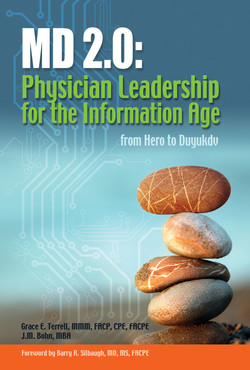Читать книгу MD 2.0: Physician Leadership for the Information Age - Grace Emerson Terrell MD - Страница 5
На сайте Литреса книга снята с продажи.
ОглавлениеForeword
By Barry Silbaugh, MD, MS, FACPE
The greatest of all heroes are those who don’t consider themselves such. Despite accolades and honor from the world, they view their accomplishments as just doing their job. They believe that every other man or woman, when faced with similar circumstances, would behave the same way. In short, they see others as having the same potential to be heroes in the eyes of the world. This attitude is at the heart of remarkable leaders, across all cultures, governments, and industries.
As a young man convinced that a career in medicine would confer upon me the hero status of my role models — the doctors in my community — I willingly entered the competitive undergraduate world of pre-medical education to pursue my goal. I was proud to be accepted into the physician culture of self-sacrifice to serve others. My academic mentors taught the essential ingredients of the traditional hero’s journey: trust only yourself, be decisive, act independently, and know that you are special because you are one of us.
That perspective caused more trouble than satisfaction.
Grace Terrell and J.M. Bohn have written an insightful, timely, well-researched and referenced book about important issues of our time: Where can we find physician leaders? How do they think and act differently? How can physicians develop the needed skills, attitudes, and behaviors necessary to lead our nation’s health system to better performance for of us — consumers, patients, and health care professionals?
This book provides both historical and deep personal perspective from a physician who’s traveled the common path from endlessly curious student to clinician. Dr. Terrell has also traveled the uncommon path: from clinician to health system leader. Her passion and talent for writing, coupled with her practical experience as a clinician and leader, makes the reader see not only how conflicts arise in health care, but what must change for improvement to occur. Whether you’re a physician, someone who lives or works with physicians, a policy maker, or someone who seeks to understand how our health system became so complicated and confusing (and how to improve it), this book provides both historical and deep personal perspective in answering those questions.
During my tenure as CEO of the American College of Physician Executives, I have been fortunate to know Dr. Terrell as a Board member with uncommon ability to frame critical issues with appropriate questions, research, and relevant personal stories. She and J.M. Bohn use those same effective techniques in Physician Leadership in the Information Age.
No one illustrates the hero to leader attitude and transition better than Jeff Skiles, co-pilot on USAir Flight 1549 that landed in the Hudson River in the winter of 2009. Listening to Jeff describe his work on that fateful day in some presentations we’ve done together with physicians and health system leaders, he says he was just doing his job as part of a well-trained team. He describes the flight attendants’ actions that day with awe and respect. He points out that he and Captain Sullenberger, air traffic controllers, ferry boat operators, and others all knew when teamwork was required, and when they needed to act autonomously. Paradoxically, when leaders approach their roles as members of a team, no better or worse than others, and not as heroes, heroic accomplishments occur.
